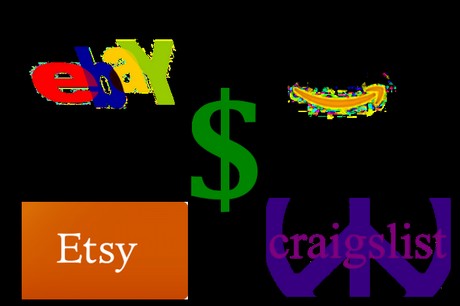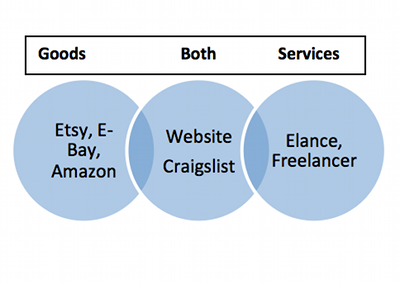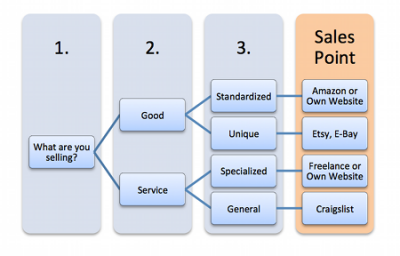
The Internet marketplace is a great opportunity to turn your hobby or skill into an extra source of income. Do you love to knit? You could sell your handmade doilies on Etsy. Are you a great illustrator? You could sell your services on Freelancer. For a more professional and intense level of business, you could open your own website or become an Amazon business.
What you are selling and the time you have to dedicate to the project determine where you should vend your goods or services.

Venues: It depends on what you are selling
Should you have your own website?
A key question is how much time you choose to invest. For example, if you plan to eventually make your side business a full time career, it may be smart to invest in your own website, even if you advertise on another aggregating website. An example is a graphic designer advertising on Craigslist who also refers clients to his own website which includes a full portfolio of his work.
A dedicated website also might be necessary if your work is specialized in a way in which clients would seek much more information about you, for example a tax preparer. In contrast, providing a general service such as dog-walking may not require a dedicated website, however it is still an opportunity for you to showcase your services and to give enough information about yourself so potential clients know whether they can trust you with their precious pups.
Some aggregation websites specialize in a certain type or types of business and allow sellers to build fairly comprehensive profiles. Elance, which promotes freelancers and provides payment and quality tracking tools, is one such site. In such a case, a separate website may not be necessary. A simple Internet search of your skill or industry will reveal any specialized aggregation websites. For example, clients looking for personal chefs in their area can find them using the American Personal and Private Chef Association.
Payment Systems
Certain aggregation sites are popular because they also provide payment systems and website management. They manage the front end of the system (taking payments from customers) and you plug into the back end of the system by connecting your bank account or Paypal account to the site.
However, if the specialized website does not allow for a full profile, having your own website or public Facebook profile becomes more important. If you are managing your proprietary website you can still embed payment systems like Paypal, BillMeLater or accept payments from credit cards. The latter involves opening a merchant account with your bank and possibly selecting a payment services provider if that service is not provided by your bank[i].
Setting Up a Website
Setting up a website involves registering a domain name, choosing a hosting service and getting the website itself designed and built. Domain names are what Internet users type into the browser to go to your website. You register your domain name with a web hosting company, which also performs a search to confirm that it is unique. A list of popular web hosting companies can be found here. Registration is cheap, costing between $2 and $25 per year, depending on the popularity of the name. For example, names ending in ‘.com’ are more popular and expensive than the equivalent ending in ‘.net’.
Hosting is what makes your site available on the Internet. A hosting company houses the files that make up your site on a server. Many of the web hosting companies that offer domain registration also offer server hosting services, such as Go Daddy. Free website hosting is also available from reputable companies such as Google Sites, however most such sites do offer only limited storage. The previously referenced list of web hosting companies is also relevant for server hosting services. It is possible to host your website on your home server, but this may violate your terms of agreement with your Internet Service Provider and would likely result in an extremely slow loading website that could not handle even moderate traffic.
You can create a website yourself using free/cheap and easy templates such as WordPress at www.wordpress.org, not to be confused with the free blogging platform www.wordpress.com. A good explanation of the steps to creating your own website, using WordPress as an example, can be found here. There are also all-in-one companies that provide design and hosting services such as Intuit Websites. Despite the many simple tools and templates, building your own website does require some tech savvy. An alternative is to hire a professional web developer to build the website based on content you create. You can find a list of top web design companies here. Many web designers also freelance.
Popular Aggregation Vender Sites
Vendor aggregation sites can provide significant upside. Depending on the site, sellers may not have to worry about payment systems. Aggregation sites also provide a marketing boost since they are often online destination shopping areas, similar to the role of anchor stores in physical malls. For those selling goods, Etsy (for handicrafts and vintage collectibles), Amazon [multiple products] and eBay (multiple products in an auction or shop format), can be great venues.
For those selling services, Elance, Freelancer and Craigslist all provide a platform for a broad spectrum of service providers. Craigslist also allows the sale of goods but the very pared-down look and feel of the site is not a popular choice for an ongoing business.
 Marketing
Marketing

How will customers find your online business? And why will they take a risk for a product or service they cannot test beforehand? The first question deals with the visibility of your business, the second with its credibility.
Search Engine Optimization
Customers that already searching to purchase your product or a similar product find your business through Internet search engines such as Google, Yahoo, and Bing; searches in aggregation sites such as Amazon and through industry blogs and forums. This is why it is especially important to ensure that all of your marketing material – website, business profile, product/service descriptions – are search engine optimized, known as SEO. SEO refers to actions taken so that search engines rank your site highly in the search results of relevant searched words. Techniques include editing the content and code of your website to include keywords so that search engines easily ‘understand’ the focus of your site and being linked to by other highly ranked sites. An example is that if you are selling custom made hats, you should include the word ‘hat’ in your titles and headings. A more in-depth description of search engine optimization strategy can be found here.
Social Media
Part of the reason search engines consider what sites link to your sites when ranking your website goes to the issue of credibility. Social media has the added advantage of introducing an element of credibility to your business; people a more likely to trust goods and services recommended by friends and acquaintances. This is why companies advertising on Facebook want you to ‘Like’ their products’.
If you don’t already, begin following blogs in the industry of your business. Once you have a website or profile up, write a blog or two yourself. Offering to pen a guest blog on a blog with a similar audience, though not a direct competitor, can get your product in front of new eyes. The key is to find ways to interact with your potential customers. A more visual strategy is to start a Pinterest board with pictures of your good or service in use or create an instructional YouTube video. Your blog and/or Twitter can be used to promote any specials or giveaways, or news about your company or industry. Seek to offer people something of value, whether a new perspective or new product use.
Paid Advertising
You can take advantage of search engine optimization strategy by purchasing ads in a search engines sponsored links. This advertising strategy can be very affordable since you are charged per person that clicks on your ad – pay-per-click or PPC. Google Adwords and Bing and Yahoo provide such services. Targeted ads can be purchased on Facebook or on other blogs and websites with your target audience.
Other Visibility and Credibility Strategies
Other methods of introducing credibility to your product include offering guarantees and generous refund terms. Include photos of the good or samples of the service, and a frequently asked questions section so that customers understand what they will be receiving. It is important to be transparent and adhere to all the promises you have made.
External confirmations are also meaningful. For example, you should publicize membership in industry associations, licensing, customer reviews or any press you receive.
Though you have started an online business, there is no reason you cannot promote yourself in-person. Festivals and trade shows are great, low commitment, strategies to allow potential customers to interact with your product before purchase and that allow you to learn about your customers.
Pricing
A challenge most online vendors face is pricing. It is important to consider the market rate – what your competitors are charging – and also to charge for your time. Understand how much time you have to dedicate to your business and set a target for how much revenue you need to generate to make a project worth it. For example, if you have 20 hours a week in which you can work and you are looking to make a minimum of $1000 per month, your floor is $12.50 an hour. Below a certain price it may not make sense for you to sell a service or good at all. Now for a five hour project, this means your minimum price is $62.50 plus the cost of any inputs (materials you must purchase) and shipping if necessary. How does this compare to the pricing of competing projects? Remember, that you can change your prices once you are out in the market, but it is always easier to reduce pricing rather than raise it.
Production
Because products involve a physical (rather than electronic) delivery, and often have higher out of pocket production costs, they are a bit more complex than selling services online.
When selling goods, there is an extra step of considering their production. The production of services generally relies on your skill set, experiences and access to research and other information. Production of goods relies on your access to particular materials. If formerly you were using left over, extra or otherwise ‘free’ materials for your hobby, you must contemplate what will happen if and when you increase the number of items you make. Will your costs go up as you now must buy new what you had previously been able to obtain for free? Will you even be able to find enough of the materials you need? What substitutes are available?
Of course, you do not necessarily have to make your product yourself. Many options exist for outsourcing, both nationally and internationally. The specific companies will differ depending on the industry. Your local Chamber of Commerce is a good first stop for companies looking for local or national manufacturing. For international manufacturing, China and India are popular destinations for large orders; Alibaba is a well known site connecting Chinese manufacturers with the world. However, a small business in need of placing short-run orders might be better off looking in other countries. For example, Turkey and Morocco have long had manufacturing sectors in leather. The U.S. Embassy in your country of interest will have a commercial section that can advise American businesses.
The Legalities
Intellectual Property
Intellectual property covers copyrights, patents and trademarks. It is essential that you protect your original work, ideas and products. Copyright gives authors exclusive rights to their work (writing, music, etc.) for their lifetime plus 50 years (in most jurisdictions). In the United States, as in most countries, the author does not have to undergo formal procedures to secure copyright. However it is possible to formally register your work for copyright by applying to the US government’s Copyright Office for a fee of $35.
While copyright protects works of authorship, patents protect inventions (which can be items or processes). Patents are not automatic and must be filed by the inventor with the United States Patent and Trademark Office. As is implied by the name, the same office handles trademark filings. Trademarks are signs or designs exclusively used to identify your business and its products. Most company logos are trademarked. Patent and trademark filing fees start at $280 and $375, respectively[ii].
Intellectual property protections help ensure that you are recognized, credited and paid for your work. For example, many professional photographers release initial prints with a watermark of their trademarked logo in the background. The clean pictures are not released until after the client has paid. Another example, is after putting in the marketing work to build your brand, you would not want another company using your name and logo.
Regulatory Issues
The good or service you are offering may be subject to federal, state or city regulations. Ask, who is the regulating body for your industry? A good source of information is relevant industry groups. Some red flags that indicate you probably will face some regulatory scrutiny:
- Do you handle sensitive information? For example, medical information.
- Are you selling a product people will ingest?
- Are you making any claims about the product you cannot verify?
Should you incorporate a company?
It is generally a good idea to incorporate a limited liability company as soon as you commit to regularly selling your product or service. A limited liability company, versus a sole proprietorship or individual, will protect your assets in case of any problems with the business. For example, if a customer blames your product for damage and sues the company for negligence, only the assets of the company are at risk. Your personal assets – your house, car and personal bank accounts – are not exposed to the law suit.
A second advantage of forming a company is that business expenses are tax deductible. This means if you go into business selling tie-dyed t-shirts, before the revenue from those sales is taxed you can deduct the cost of materials (t-shirts, dye, water), utilities (electricity, water) and labor. The amount taxed might end up being far less than if you had counted those sales as personal direct income. As always, consult an accountant on your particular situation.
To incorporate a business you must file Articles of Incorporation with the Secretary of State of the state in which you wish your company to be domiciled. In addition, a corporation must be registered in each state in which it transacts business. For this reason, many small businesses choose to simply incorporate in the state in which the physical store is located. As an online business with no brick and mortar, you have much more flexibility in choosing where to register your company. Certain states, such as Delaware, have a robust business infrastructure and favorable tax laws. Other states, such as Nevada, offer the benefit of no filing fees, no corporate tax and low business license fees[iii]. It may cost from $500 to over $1000 to incorporate a company between filing, licensing and other fees. A good resource is the US Small Business Administration site. Also consider consulting an attorney.
Continuous Income Stream
Many readers have had some experience selling items or services online. There was the time you had to move cross country and sold your furniture Craigslist or cleaned out your garage and made a tidy profit on E-Bay. A more focused approach to online sales can yield a steady stream of secondary, or even primary, income. The steps outlined above will help you get started
[i] http://www.smashingmagazine.com/2011/04/11/taking-credit-card-payments-online-whats-involved/
[ii] http://www.uspto.gov/web/offices/ac/qs/ope/fee031913.htm#tm
[iii] http://www.myllc.com/which-state-to-form-llc.aspx
